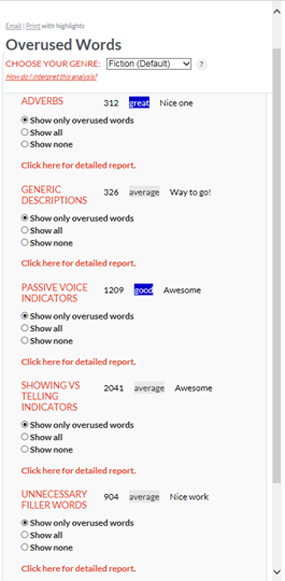|
Posted: 30 Mar 2016 10:04 PM PDT
Since Erika talked about
overused words yesterday. I thought I would point out how AutoCrit helps you
spot commonly overused words and sentence constructions that weaken your
manuscript, including generic descriptions, passive voice, adverbs, and more.
The the analysis sidebar
shows you the number of words found in a category and recommendations for
improvement. It is important to remember that this is a suggestion only and
not a hard number.
They compare your manuscript
to samples of successful published fiction, including mass market paperbacks
and bestsellers. If the number of overused words in your manuscript exceeds
the average found in those published works, we’ll highlight the problem in
your manuscript for quick analysis and editing.
For example, published
fiction typically has about 10 adverbs per 1,000 words. If your
manuscript has 30 adverbs per 1,000 words, AutoCrit will suggest that you
remove about 20 of those.
Below is a screen shot of my
sidebar report for overused words for my 78,000 word novel. I have found
it very helpful picking up things that you don’t notice.
 The
words we look for fall into several categories. For more information on each
of these writing pitfalls, click the category below. The
words we look for fall into several categories. For more information on each
of these writing pitfalls, click the category below.
§ Adverbs: Those –ly words, such
as quickly or happily. They rely on a weak adjective or verb (quickly
walked); they can almost always be replaced by a single strong adjective
or verb (ran, galloped, bolted).
§ Generic Descriptions: We look for
descriptive words that could be replaced with more specific adjectives; words
such as nice, good and pretty are generic and tell
instead of show.
§ Passive Voice Indicators: Words such as has/had
and was/were are classic indicators of passive voice; this sentence
construction can be clunky or confusing for the reader.
§ Sentence Starters: Sentences that start
the same way too frequently, including initial
conjunctions (conjunctions such as but, and, or so)
and sentences that start with –ING verbs. (Using this structure too
often can be distracting to the reader, and many writers use it incorrectly).
§ Showing versus Telling: Words like was/were,
hear/heard, watched/observed/noticed, and went may indicate
you’re telling the reader instead of showing them.
§ Unnecessary Filler Words: That, just and
other filler words creep into our writing but can be eliminated in almost all
cases.
The Bottom Line
While using any word is fine in
moderation, overusing a particular word or sentence structure can sap the
energy from your writing. Make sure every word earns its place on the
page.
AutoCrit will highlight the
words you could work on to eliminate. It also, gives you a list of words
which you can click and walk you through each one letting you decide
whether that word can be corrected. It points out repeated words
and phases, too. And as you can see from the sidebar, it gives you a little
pat on the back when it compares your writing to other books in
your genre. They have a 7 day free trail and I was offered a discount when I
decided to purchase. Check it out.
Talk tomorrow,
Kathy
Filed under: Advice, authors and illustrators, Editors, opportunity, Process, revisions, Writing Tips Tagged: AutoCrit, Overused Words |
|
You are subscribed
to email updates from Writing and
Illustrating.
To stop receiving these emails, you may unsubscribe now. |
Email delivery powered by Google
|
|
Google Inc., 1600
Amphitheatre Parkway, Mountain View, CA 94043, United States
|
|

No comments:
Post a Comment